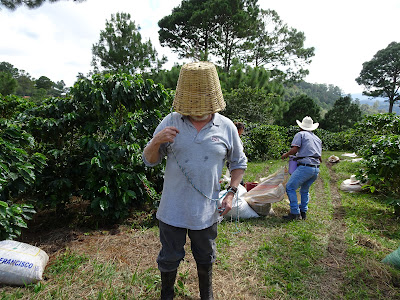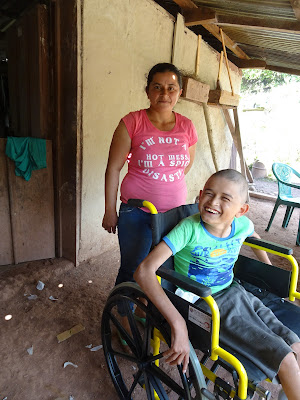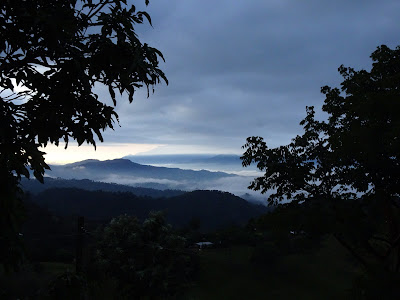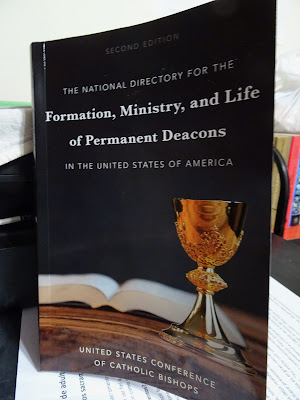Here’s a review of my life this past year.
Visits to the US
I visited the US three times for very different reasons.
For almost four weeks in May and June I went to Iowa, primarily to renew my Iowa license. But I also took advantage of the visit to get two doses of the Pfizer COVID-19 vaccine as well as to go on an eight-day silent directed retreat at the Creighton University Retreat Center in southwest Iowa. It was also a good time to catch up with some friends.
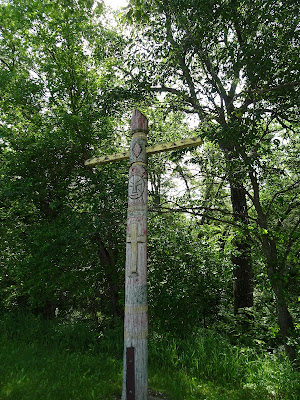 |
| Cross - Creighton Retreat Center |
In October I went for my annual visit to St. Thomas Aquinas Church in Ames, our sister parish. I got to connect with more people.
In December, I took part in an 8-day study-immersion with Maryknoll at the US-Mexico border at El Paso-Ciudad Juarez. It was good to see and hear about what is happening at the border, since we have so many people who have migrated from our parish. Just this week I heard that one rural village has seventy people in the US. It is helpful to have more accurate details of what is happening at the border, although it seems as if things are constantly changing.
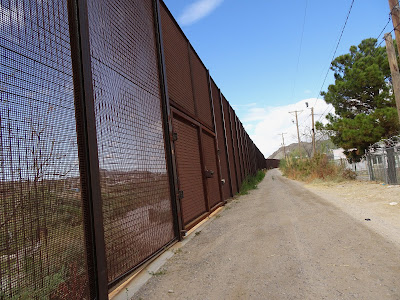 |
| Border wall between El Paso and Ciudad Juarez |
Parish formation work
I’ve had several meetings with catechists, mostly meeting them for meetings in the various sectors of the parish, though we had one general meeting. I’ve also assisted the pastor in his meetings with the catechists for confirmation. (We will have about 500 confirmed early next year.)
I’ve also accompanied the meetings of the communion ministers as well as the formation meetings of delegates of the Word.
Our parish participated in the Asamblea Eclesial – Church Assembly – of the Latin American Conference of Bishops. We had more than ten “listening” sessions, including one in each rural sector.
I also helped in putting together the synthesis, in the parish and the diocese. I was a little “bull-headed” in the synthesis sessions, insisting that we use the words of the people (instead of general terms, such as "secularism") and that we not discard something because we don’t agree with it or think the people didn’t understand the question. But, for me, the listening sessions were a great experience, although we had to explain some of the terms in the material provided by CELAM, the Latin American Bishops Conference.
Responding to the needs of the people
The parish has a solidarity fund which we use to help subsidize the efforts of people to respond to needs.
There was also a donation from St. Thomas Aquinas Church that helps people rebuild after last year’s hurricanes. With these donations we’ve provided help to at least four families to replace their homes and to others to subsidize the costs of medicine or medical procedures.
I am probably a bit too demanding, but I ask to see that the family in need is providing something (even if it’s only labor) and that the local church community also is working to help the family.
The help is a subsidy and, I hope, a way to encourage people to help each other.
November, 2020, we were devastated by the two hurricanes that hit Honduras – though not as much devastated as other parts of the country.
We thought it would be helpful to help the people be more prepared for emergencies. I developed a short workshop, based on a project that Caritas Santa Rosa had run a few years ago on community-based responses to disasters, based in the work of a Filipino community organizer, Rusty Binas.
We had meetings in six parts of the parish. A few were very well attended and the people went on to organize their communities’ even though we didn’t need to mobilize the committee this year, I believe that we have helped the people to see that they can do things in their communities – and don’t have to wait for politicians or other groups.
Medical and psychological problems plague the people in Honduras.
I have worked for several years with Honduras AMIGAS, a Missouri-based group that has sent brigades to Honduras for many years, in the last few years to our region, especially in the municipalities of Concepción, San Agustín, and Dulce Nombre. They came once this year and spent three days responding to needs.
They also provided a wheelchair for a young man in a very distant village, which I delivered.
Caritas of the diocese of Santa Rosa has done some psychological assistance for about three years. I connected them with a family in a distant village that suffered the murder of a young woman. This year they sent out psychologists to work in the parishes. We arranged visits in several communities during the first week of July.
Sacramental and pastoral ministry
I continue to do the final interview of couples before their weddings. This year I did the interviews for at least 10 couples. I usually don’t preside at the weddings since most want a Mass (and many who have being living in “union libre” want to go to confession before the wedding.) But I did have the privilege to preside at one wedding this year, since the pastor was away. It was sheer joy to me.
I also continue to baptize, though I don’t know how many. Often this is in the context of a Mass, but there have been several cases where it has been just a baptism in the context of a Celebration of the Word.
This past week I baptized two children at Mass on Christmas Eve and two children at a celebration in the main church on the day after Christmas.
I also have presided at five or so funerals this year. Three were particularly difficult.
In March I went to the Mass for a young girl from a distant village with epilepsy and special needs; she always came with her mother to the celebrations and Masses in her village. The Mass would be in a village closer to the cemetery but I went to transport the casket and people from her village. The people had put the casket in a pick-up with a longer bed and so I just transported folks.
In April I was called to a village where someone had been murdered. I stayed there until they took the body to the morgue in Santa Rosa and then returned the next day to help them transport the body from Santa Rosa to the community. I wrote about this here and here.
In October I went to a funeral of an elderly woman but when I got there a young woman asked me if we could include her son in the prayers. He had died in the US about two years ago, but it had taken all that time to identify the remains and send back the ashes. I wrote about this earlier this year here.
I also continue to visit the sick, though not as much as before, though I hope to do more visits this coming year.
In one case, I was ready to spend several hours visiting the sick after the Sunday Celebration of the Word with Communion. But a road had nearly washed out and I arrived late at the Celebration and didn’t have time to visit those who lived far from the church in the center of the village.
I also continue my practice of going on most Sunday mornings to villages that don’t have a communion minister for a Celebration of the Word with Communion. I also almost always go to a Mass in the afternoon, where I almost always am asked by the pastor to preach.
I also participate in many of the parish-wide activities - the celebration of our feast day, the rites of the catechumenate, Holy Week, Christ the King, Christmas.
 |
| Feast day procession |
This year, though, the pastor asked me to be at an Easter Vigil celebration in a rural community.
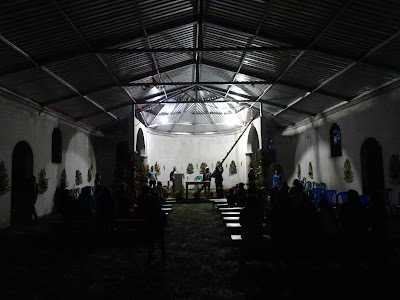 |
| Preparing for the Easter Vigil in Vertientes |
I also have participated in several diocesan events, including the Masses of ordination of three young men. The day after Christmas (which I spent with the Dubuque Franciscan sisters in Gracias, Lempira), we went to Mass at the Gracias cathedral and the bishop invited me to serve as deacon at the Mass. The bishop preached - quite well, I thought.
What else?
This year the artist we hired finished the murals in the church – which are splendid. We also had him do a mural of St. Thomas Aquinas for the new auditorium of the parish, named in honor of St. Thomas Aquinas to remember, with gratitude, the generous support of our sister parish.
I also helped in our parish coffee field, mostly transporting the volunteer workers from the parish.
This year I have, as before, participated in various diocesan meetings. But they are fewer than before and our deanery has not met even once since the pandemic began in March 2020.
I have taken advantage of some educational programs offered on Zoom. Some have been mediocre, but a few have been good including one on the diaconate by a Dominican priest from Colombia.
I have been reading a lot, about 54 books this year. I’m planning to write another post today or tomorrow on my reading. There were a few books I found very good.
Politics
This past November we had elections for the president, the National Congress, mayors, and more.
 |
| Internal election site in Plan Grande |
The election process was not completely peaceful in some parts of the country, including the deaths of several people, including a few candidates. There was also some publicity accusing some candidates as promoting communism and more. There were reports on the internet of possible lock downs after election day.
Election day came and went with some conflict and lots of dissension, but almost entirely peacefully.
The big surprises were the results.
In Honduras there have been two traditional parties – the National Party and the Liberal Party – which have controlled the elected offices for more than a century. But after the golpe de estado (coup) in 2009, a new movement and a new party emerged LIBRE. In earlier elections they made a few gains, mostly in terms of congressional representatives and a few mayors.
This year the newly elected president is from LIBRE, Xiomara Castro, the wife of the president overthrown in 2009 in the coup. She won majorities in all except one department of the country.
But there were other surprises. The newly-elected mayors of the two largest cities, Tegucigalpa (the capital) and San Pedro Sula (the industrial center of the country), are from LIBRE. Though LIBRE doesn’t control Congress, neither does the National Party which had been controlling the presidency, the Congress, and the Supreme Court for many years.
Locally there were surprises.
In the internal elections earlier this year, one candidate in the municipality of Concepción defeated the incumber who, with his brother, had held the position of mayor for many years. He won in the November election.
In the municipality of Dolores, a thirty-one year old whom I have known for several years due to his participation in the parish, especially with youth. He defeated the incumbent mayor. I’ve talked with him a bit and I hope that he can be a breath of fresh air for his municipality.
Over all, the big surprise is that, in a country where the two traditional political parties held major power, promoting voting by party for all candidates – called votar en plancha, many people voted for candidates from different parties for different positions.
I think there might be several reasons why this happened.
First of all, the candidates for the two traditional parties seem to have ties to money laundering, drug trafficking, and more. I think the people were so fed up that they decided “no more,” and so they voted for candidates from other parties.
In addition, the Bishops of Honduras put out a very strong statement before the elections. Just read this one section of their letter.
We ask the people to overcome sentiments of indifference, apathy, and skepticism, brought on by our deficient system of government and its institutions, and which result in absenteeism.
We, the bishops of the Honduran Bishops Conference, make an urgent call for you to go and vote, with responsibility and liberty. Our country is living through momentous and significant times. Therefore, we urge you to give you vote to the best candidates, with the best personal, familiar, and social profile, who are honest candidates, responsible and sensitive to the needs of the people, who participate in good politics, in favor of life and the family. This is to say: elect those candidates who, like you, think in favor pf a better future for your children.
If you discover that you have in your hands the potential to aid the good of our fatherland and change the ineffective and unproductive direction that we have as a nation, you will take into account that your vote is sacred and that you cannot give it to someone who does not deserve it.
Honduras does not deserve you voting for those who want to destroy it and seek to gain the elections “as it happens” [a como dé lugar], including fraudulent and deceitful actions. Elect candidates who are not stained with corruption, organized crime, and drug trafficking which have damaged the population so much. Be careful with the call of some candidates to “vote a straight ticket” [votar en plancha], which means renouncing the capability to elect conscientiously, as a fruit of a profound reflection.
The electors should not be part of a fraud, for no reason at all and in no circumstance whatever, nor should they approve or consent to abuses of power, like the ones that happened in the last electoral processes: you have to live the electoral process as a true civic festival, during and after the elections.
As Bishops and pastors, we feel obligated to make a call to the consciences of all citizens to be objective observers of the electoral process, in order to avoid any irregularity, and, if there are any, to know how to denounce them.The future
There are some hopeful signs – many as a result of the election.
But there are serious problems, including the continuing presence of gangs in the cities, and of organized crime and drug-trafficking throughout the country, at times aligned with political and military powers.
In addition, the economy is precarious. Just this week I heard some people talking about how some agricultural fertilizers had gone up one hundred percent. Though the cost that growers are receiving for coffee is going up, the cost of inputs may lessen the positive effects.
This coming year I turn 75 years old. I have no plans to retire. I may slow down a bit, but I am doing what I love and I want to continue to serve the people here. I also want to continue to be blest by the natural beauty here.
I pray that God gives me the health and strength to continue.
I do have my COVID-19 vaccines ups to date, even receiving my booster in the Dulce Nombre health center on Wednesday.
I do need to see my dentist and doctor soon, but what can you expect for a seventy-four year old?
 |
| March 29 in Debajiados |
